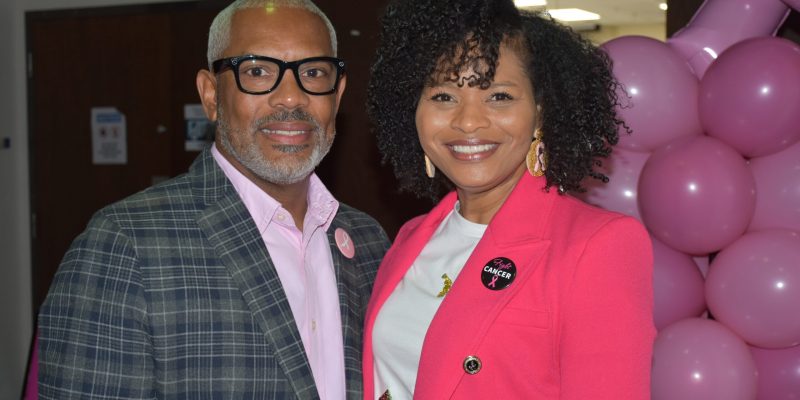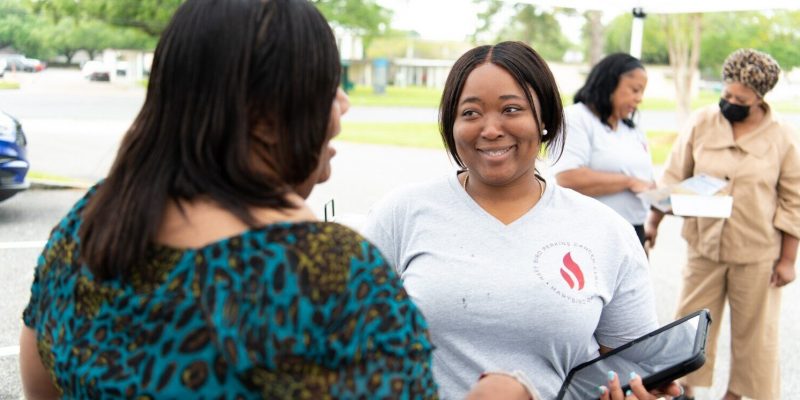“I knew I had to live to tell my story.”
Telling her story – a fight against Triple-Negative Breast Cancer, or TNBC – is what Tracey Neldare does a lot these days. At 54 years old, Tracey is two years cancer free. Her personal story at last month’s Untie the Ribbons event, hosted by Mary Bird Perkins Cancer Center, highlighted a day of education on the aggressive form of breast cancer and the disparities African American women in North Baton Rouge often face.

Her Story Begins
As the world began strict precautions in March 2020 as COVID-19 spread, Tracey, like many, was trying to navigate lockdowns and a new work-from-home mandate. Living through a global pandemic was challenging enough, but that would be the least of her worries after she conducted a self-breast exam and noticed a lump.
“Just like a lot of us, I thought it was no big deal and that it would just go away,” she recalled to the large group of women attending Untie the Ribbons at Southern University.
At first, Tracey told her husband, Tramelle, she would wait to see a doctor when the first COVID wave waned, especially since she wasn’t due for her annual mammogram until July 2020. But with her mind racing, Tracey scheduled an appointment within a few days.
That appointment, at Mary Bird Perkins’ location on the campus of Woman’s Hospital, included several more tests and exams for Tracey, who was all by herself since visitors weren’t allowed inside the hospital. Tramelle could only sit in the car, providing moral support from the parking lot.
After a few days, Tracey’s doctor contacted her to schedule a Zoom meeting to discuss their findings.
“I didn’t hear a word after that”
Two years later, Tracey still remembers logging onto that Zoom and seeing her doctor virtually. “She told me, ‘Tracey, you have breast cancer. You will definitely need chemotherapy. You will need surgery and you will need radiation,’” she recalled to a room of her peers. “I didn’t hear a word after that.”
Suddenly, Tracey found herself wondering, “how do you handle something like this?”
She would soon find out she would handle her cancer treatment, which included 14 rounds of chemo, a lumpectomy, and 30 rounds of radiation, with the support of her friends and family.
A group of friends, who she dubbed her “prayer warriors,” would set up shop in the parking lot to pray for Tracey while she was inside getting treatment.
“I would stand in the window and wave and give thumbs up,” Tracey said.
Though physically distant, they were with her every step of the way.
“I didn’t fight alone,” she said. “They were fighting with me and for me when I didn’t think I had the strength to fight for myself.”
“I had too much to live for”
Through every appointment, the loss of her hair, and days spent sick on the couch,” Tracey said she didn’t agonize over any of that.
“Living was all I wanted to do,” she said.
Even now, cancer free but experiencing side effects, including lymphedema and foot pain, Tracey says those things don’t bother her because she is alive and able to tell her story.
Though TNBC only accounts for about 10-15 percent of all breast cancer cases, according to the American Cancer Society, its aggressiveness provides fewer treatment options and usually a worse prognosis. This is why Tracey never turns down an opportunity to tell her story – hoping her message of self-examination, healthy living and early detection will prove valuable for someone else. Just like every cancer, the sooner TNBC is detected, the better chances for a successful outcome.

1 in 8
One in eight women will be diagnosed with breast cancer in her lifetime – a statistic Tracey repeatedly mentioned at Untie the Ribbons.
In Tracey’s eight-woman friend group, the ‘Sassy Sisters,’ she is that one in eight. Before the room of highly-engaged women, Tracey explained whether or not you are that one, a breast cancer diagnosis will impact you.
“We all have friends and are a friend to someone,” Tracey said. “We don’t know who that one in eight will be. But if that one is not you, it will be a family member. It will be a friend or maybe a coworker. That one will need you.”
Reflecting on her journey, Tracey says the support she received from friends and family was critical.
“That one is going to count on you for an ear. A meal. Transportation. A shoulder. But, most of all they will need you as a prayer warrior,” she said.
Educate. Enlighten. Empower.
In Louisiana, more than 500 new cases of Triple-Negative Breast Cancer are diagnosed each year. While 6 out of 10 of these are detected at a localized (earlier) stage, nearly 40 percent have become metastatic or expanded beyond the breast and surrounding lymph nodes by the time of diagnosis.
Untie the Ribbons aimed to provide critical education resources to African American women, who are more greatly affected by TNBC. Beyond Tracey’s testimony, participants heard from Constance Blunt, M.D., medical oncologist, Mary Bird Perkins Cancer Center, about the specifics surrounding a TNBC diagnosis, and Victor Lin, M.D., Ph.D., medical director, clinical research and genetics, Mary Bird Perkins Cancer Center, on how genetic testing and clinical trials can improve outcomes.
Lastly, a fashion show, featuring cancer patients, survivors and supporters also empowered women to take charge of their health, while honoring those on a cancer journey.
